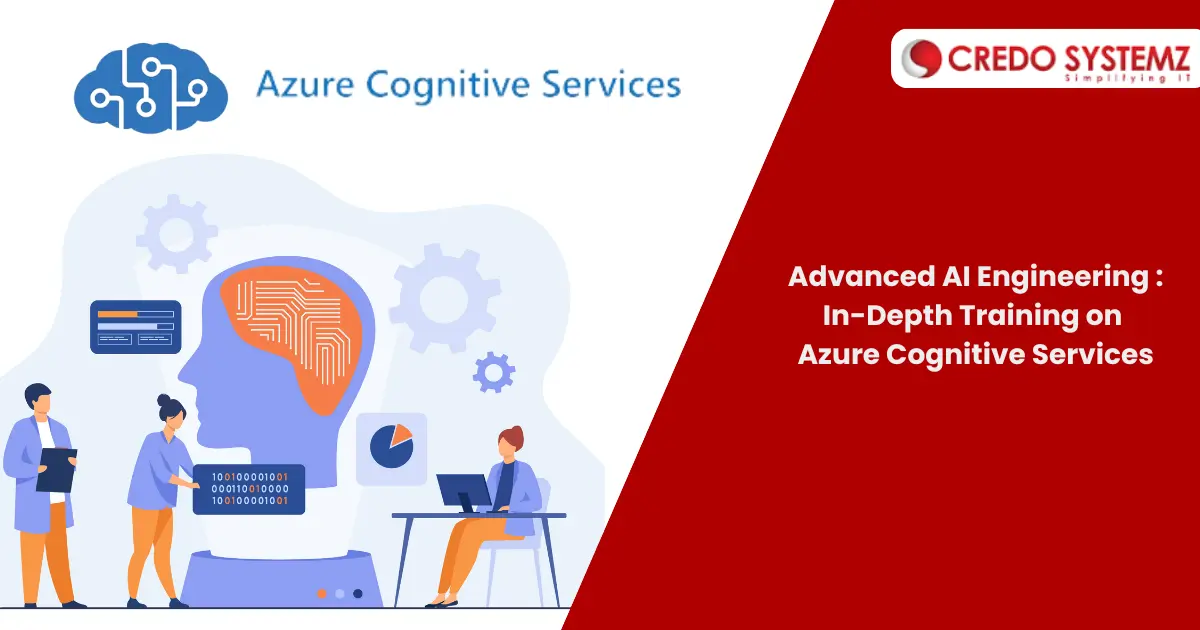
Introduction
Azure Cognitive Services is crucial to build intelligence applications without the knowledge of AI or data science. It is a suite of APIs, SDKs, and services that incorporates artificial intelligence capabilities into applications. This article provides an in-depth understanding of Azure Cognitive Services and advanced techniques to leverage the powerful resources.
Azure Cognitive Services
Azure Cognitive Services is a set of cloud-based APIs and services provided by Microsoft Azure. These services allow applications to interpret human needs using natural methods of communication.
Key Categories of Azure Cognitive Services
Azure Cognitive Services is divided into five main categories:
Vision
To enable advanced visual analysis capabilities into the applications. Analyzes visual content in different ways using services, like:
- Computer vision API
- Face API
- Form Recognizer
- Video Indexer
- Custom Vision
Speech
To build applications using advanced speech processing capabilities. These applications understand and interact with users through spoken language using:
- Speech to text
- Text to speech
- Speech translation
- Speech recognition
Language
Process and understand natural language with pre-trained models. The key language services provided by Azure are:
- Text Analytics
- Translator
- Language understanding
- QnA Maker
- Azure Open AI Services
Decision
To design applications that make intelligent decisions based on data analysis. Enhances content with personalized user experience, detecting anomalies by:
- Personalizer
- Anomaly detector
- Content moderator
Search
Incorporates intelligent search capabilities into the application using:
- Azure cognitive search
- Bing search API
Advanced Training Techniques
AI engineers can enhance the performance of models by utilizing advanced training techniques, such as:
- Custom vision
- Speech services
- Language understanding
- Anomaly Detector
Custom Vision
Azure Custom Vision allows to build, deploy, and improve custom image classification and object detection models. It offers a range of advanced training techniques to enhance the performance.
Data Augmentation: Enhances model robustness by increasing the diversity of training data and size of your dataset.
Transfer Learning: Uses pre-trained models to save time and computational resources on large datasets.
Active Learning:Continuously improves the model by incorporating human feedback and new data over time.
Speech Services
Azure Cognitive Services for Speech focus on enhancing the performance and accuracy of custom speech models.
Custom Speech: Tailors speech recognition models to specific vocabularies and speaking styles.
Noise Injection: Add background noise to the training data. It makes the model more robust to real-world environments.
Voice Customization: Creates unique voice fonts for specific brand identities.
Language Understanding Intelligent Service (LUIS)
Azure Cognitive Services for Language Understanding (LUIS) are used for building and deploying sophisticated natural language understanding models.
Entity Extraction: Identifies and categorizes key information from text.
Intent Recognition: Understands user intentions to improve interaction quality.
Anomaly Detector
Azure Anomaly Detector provides powerful capabilities for identifying anomalies in time-series data.
Sensitivity Extraction: Adjusts the threshold for anomaly detection to balance between false positives and false negatives.
Lag Features: Create lagged versions for the time-series data to help the model capture temporal dependencies.
Multivariate Analysis: Considers multiple variables for more accurate detection.
Best Practices for Model Training
- Quality data collection to ensure data is representative of real-world scenarios.
- Preprocessing and cleaning data to improve model accuracy.
- Handle missing or inconsistent data appropriately.
- Hyperparameter tuning to enhance model performance.Use grid search or random search techniques for tuning.
- Model evaluation with cross-validation to assess model generalizability.
- Deployment and monitoring using Azure DevOps for continuous integration and deployment.
- Implement monitoring tools to track model performance and update as needed.
Tools and Resources for AI engineers
Azure provides several tools and resources to assist AI engineers:
Azure Machine Learning: Comprehensive service for building, training, and deploying machine learning models.
Visual Studio Code: Integrated development environment that supports various extensions for AI development.
Azure Notebooks: Free Jupyter notebook service for developing and sharing documents with live code.
Azure Data Lake: Data storage service that supports big data analytics.
Azure DevOps: for planning, developing, testing, and delivering AI applications.
Conclusion
Azure Cognitive Services offers a powerful suite of tools for AI engineers to build intelligent applications. Looking for professional guidance to master Azure services? Credo Systemz offers Azure Training in Chennai by Real-time professionals. Learn this Azure course in Chennai to avail the live practical sessions. Expertise in advanced training techniques and best practices using hands-on experience. Utilizing the array of tools and resources, AI engineers can streamline their development process and create innovative solutions across various industries. you are a recent graduate or a professional looking to upskill, Credo Systemz offers a pathway to achieving your career goals. Join Credo Systemz Software Courses in Chennai at Credo Systemz OMR, Credo Systemz Velachery to kick-start or uplift your career path.
